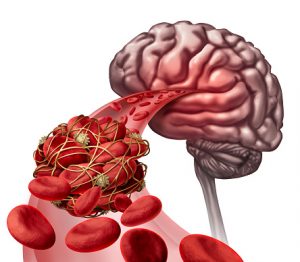
What causes blood clots in the brain?
All of us have clotting factors in our body to make sure that we don’t bleed to death if we cut ourselves, but under certain circumstances, people can experience blood clots in the brain that can be life-threatening.
A blood clot forms in an attempt to repair some sort of damage to a blood vessel. It is a gel-like mass that is formed by platelets and fibrin (a protein involved in blood clotting) to help stop bleeding. When blood clots form the wrong way inside an artery or vein, it can cause serious problems. People who smoke, take birth control pills, and are sedentary are at a higher risk of getting blood clots. Continue reading…
Dementia and Alzheimer’s disease are growing concerns as the U.S. population ages, bringing the importance of keeping your brain healthy to the forefront of many medical journals. While we all know to wear a helmet and protect your head when engaging in risky activities, there are more potential dangers to your brain’s health than you may realize.
Below are five common habits that can damage your brain that many partake in every day. Continue reading…
Brain fog isn’t a medically recognized condition, but it is characterized by the feeling of confusion, forgetfulness, lack of focus, and poor mental clarity. Patients describe brain fog as the inability to think clearly.
Brain fog can be associated with lifestyle factors or can develop as a side effect of a medical condition or medication. Determining the underlying cause of your brain fog is the first step towards treating it and thinking clearly once again. Brain fog has been commonly associated with fibromyalgia and menopause, for example. Continue reading…
Researchers have confirmed that ADHD—Attention Deficit Hyperactivity Disorder—is actually a disorder of the brain and not just the result of “poor parenting” that leads to bad behavior. Those with ADHD were found to have structural differences within their brains, meaning the variance can be seen physically.
The analysis also found that those affected by ADHD had slightly smaller brains and showed evidence of delayed development.
Lead author of the study Martine Hoogman explained, “The results from our study confirm that people with ADHD have difference in their brain structure and therefore suggest that ADHD is a disorder of the brain. We hope that this will help reduce stigma that ADHD is ‘just a label’ for difficult children or caused by poor parenting.” Continue reading…
Dementia and Alzheimer’s disease cases are on the rise as the world’s population gets older. These brain disorders are associated with significant memory loss and can impair one’s ability to care for themselves. As time goes by, a person’s memory begins to fade away, forgetting loved ones’ names and even important life events.
Although Alzheimer’s and dementia are common among the elderly, they are not inevitable parts of aging. While there isn’t yet a cure for these brain diseases, you can take steps to prevent these conditions or at least to slow down their progression.
Below you will find nine steps you can take in order to improve brain health and hold on to your precious memories for many more years to come. Continue reading…